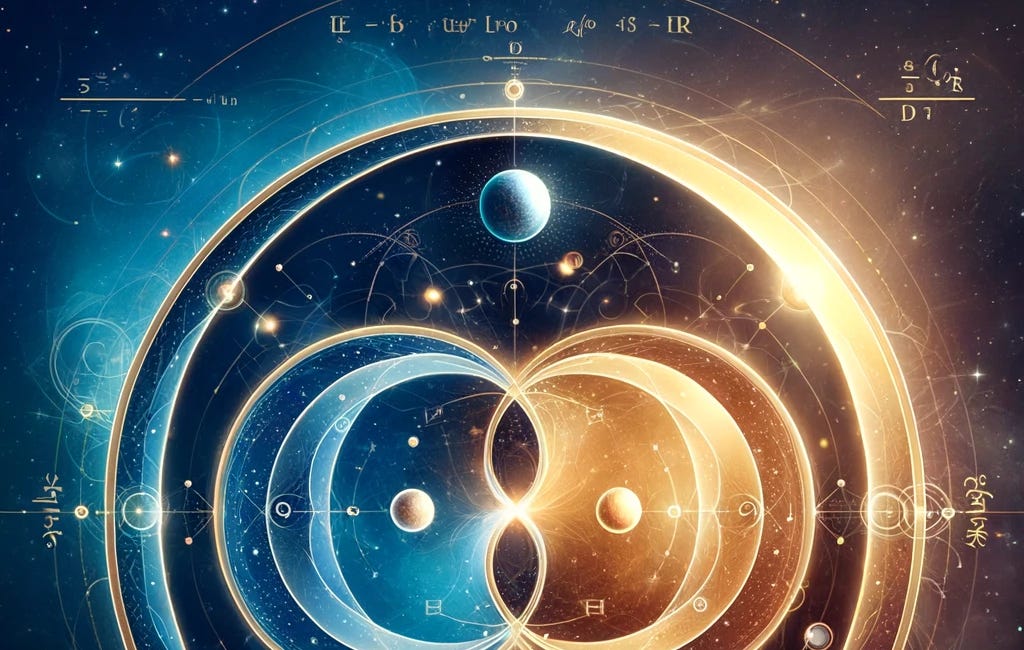Mankind in the Unified Theory of Duality
An holistic understanding of human nature, interactions, and societal structures
In the pursuit of progress, we must harmonize our material achievements with our spiritual growth. True fulfillment arises from balancing the tangible with the transcendent.
In Dr. Theo Mathis’s Unified Theory of Duality, mankind is viewed as a complex interplay of dualities that encompass physical, mental, emotional, and spiritual dimensions. This perspective provides a holistic understanding of human nature, interactions, and societal structures.
Core Aspects of Mankind
Physical and Metaphysical Duality:
Physical Aspect: The human body, with its biological systems, is seen as one half of a duality. It interacts continuously with the environment, other beings, and internal processes.
Metaphysical Aspect: The mind, consciousness, and spirit represent the complementary aspect. This includes thoughts, emotions, beliefs, and the sense of self.
Individual and Collective Duality:
Individual: Each person is a unique entity with distinct characteristics, experiences, and perspectives. This individuality is crucial for personal growth and self-identity.
Collective: Humans are inherently social beings, forming communities, societies, and cultures. The collective aspect emphasizes the interconnectedness and interdependence of individuals within larger social structures.
Temporal Duality:
Past: History, memory, and heritage shape the foundation of individual and collective identities. The past influences present behaviors, decisions, and cultural norms.
Future: Aspirations, goals, and potential drive progress and innovation. The future aspect encourages forward-thinking, planning, and evolution.
Material and Spiritual Duality:
Material: The pursuit of tangible achievements such as wealth, technology, and physical well-being represents the material aspect of humanity.
Spiritual: The quest for meaning, purpose, and connection to something greater than oneself highlights the spiritual dimension. This includes religious beliefs, philosophical reflections, and personal values.
The human mind is a symphony of rational thought and emotional depth. Our greatest insights and creations emerge when we harmonize logic with intuition
Human Relationships and Interactions
Interpersonal Duality:
Self and Other: Relationships are built on the dynamic interaction between self-perception and the perception of others. Understanding and empathy emerge from this interplay.
Conflict and Cooperation: Human interactions oscillate between conflict and cooperation. This duality drives social evolution, problem-solving, and mutual growth.
Societal Duality:
Tradition and Innovation: Societies balance preserving traditions and embracing innovation. This duality ensures cultural continuity while allowing for progress and adaptation.
Authority and Freedom: Governance systems negotiate the balance between authority and individual freedom. Effective societies find equilibrium in ensuring order and protecting personal liberties.
Psychological and Emotional Duality
Rational and Emotional:
Rational: Logic, analysis, and objective thinking constitute the rational aspect of human psychology. This drives scientific discovery, decision-making, and problem-solving.
Emotional: Emotions, intuitions, and subjective experiences form the emotional aspect. This influences relationships, creativity, and personal fulfillment.
Conscious and Subconscious:
Conscious: The conscious mind encompasses awareness, intentional actions, and deliberate thought processes.
Subconscious: The subconscious mind holds memories, instincts, and automatic responses. It shapes behavior and perceptions beyond immediate awareness.
Mankind's Role in the Universe
Explorers and Stewards:
Explorers: Humans have an inherent drive to explore, discover, and expand their understanding of the universe. This quest for knowledge propels scientific advancements and cosmic exploration.
Stewards: Humanity also bears the responsibility of stewardship, caring for the planet and all life forms. This duality emphasizes sustainable practices and ethical considerations.
Creators and Reflectors:
Creators: Human creativity manifests in art, technology, literature, and cultural expressions. This aspect celebrates innovation and the creation of new possibilities.
Reflectors: Humans reflect on their existence, purpose, and place in the cosmos. This introspection fosters wisdom, philosophical insights, and spiritual growth.
To be human is to exist within a web of dualities, each thread contributing to the rich tapestry of life. By embracing and understanding these dual aspects, we illuminate the path to a more harmonious and enlightened existence
Summary
In the Unified Theory of Duality, mankind is an intricate weave of dualities that encompass every facet of human existence. By understanding these dual aspects, humanity can achieve a more balanced, harmonious, and enlightened existence. This holistic view encourages individuals and societies to embrace their dual nature, fostering growth, understanding, and a deeper connection to the universe.
Unified Theory of Duality
In every interaction, in every particle, in every force, there exists a dual nature. This duality is not a division but a union, a harmonious interplay that defines the essence of reality. Introduction Dr. Theo Mathis's Unified Theory of Duality proposes that all fundamental forces, particles, and interactions in the universe can be understood as dual ent…



